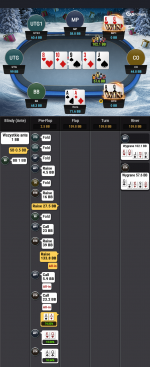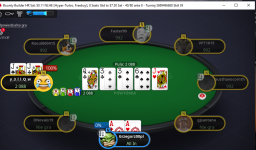A
AmiableFool
Rising Star
Bronze Level
To answer your question, we have to ask what you want to accomplish. What do you hope to gain from playing aces?
Most people think they are playing to make money, but when they lose with aces they go on such tilt that they cannot play a reasonable game anymore. They throw away lots of money just because the aces hand didn't go as expected.
Do you want to *always* feel good about the conclusion of the hand? Do you want other players to respect the way you play them? Do you enjoy embarassing other players by tricking them with a strong hand? Or do you want to get maximum value from the hand?
If your goal is to make the most money, your plan with aces is pretty simple:
Preflop:
Bet or raise to the highest amount that will get exactly one player to call. Why?
If you have no idea what raise size will get one caller, try to choose a raise size that will create a stack-to-pot-ration (SPR) of 3 or less. We'll see why in a moment.
Flop:
First, calculate the SPR. The reason is simple: SPR is an easy rule-of-thumb that tells us what types of hands are profitable to play.
Using this rule of thumb, your decision with aces is easy: Are you in a 3 SPR or smaller pot? Do anything you can to get all the chips in the middle. Are you in a 4-6 SPR pot? CBet most boards, but be cautious if your opponent decides to stick around. Avoid too much aggression on flops which heavily favor the caller, like JhTh7c. Are you in a 7+ SPR pot? Against reasonable players, proceed cautiously. Single pairs lose a lot of value.
To prove whether this advice is valid, use an equity calculator to compare your hand to your opponent's range of hands. Determine how much equity you have and compare that to the pot odds you will face if your opponent applies maximum pressure.
Good luck!
Most people think they are playing to make money, but when they lose with aces they go on such tilt that they cannot play a reasonable game anymore. They throw away lots of money just because the aces hand didn't go as expected.
Do you want to *always* feel good about the conclusion of the hand? Do you want other players to respect the way you play them? Do you enjoy embarassing other players by tricking them with a strong hand? Or do you want to get maximum value from the hand?
If your goal is to make the most money, your plan with aces is pretty simple:
Preflop:
Bet or raise to the highest amount that will get exactly one player to call. Why?
- If we get everybody to fold by raising (or shoving) to big, we limit the amount we can win to the chips already in the pot.
- If we raise too small, we risk going multiway to the flop. The value of aces goes down with every additional player in the pot.
If you have no idea what raise size will get one caller, try to choose a raise size that will create a stack-to-pot-ration (SPR) of 3 or less. We'll see why in a moment.
Flop:
First, calculate the SPR. The reason is simple: SPR is an easy rule-of-thumb that tells us what types of hands are profitable to play.
- At SPRs less than four, we can profitably stack off top pairs, overpairs, and any two pair hand
- At SPRs less than seven, we can profitably stack off straights, sets, and top two pairs
- At SPRs >= 7, we need a strong hand like a flush or full houses to get all our chips in
Using this rule of thumb, your decision with aces is easy: Are you in a 3 SPR or smaller pot? Do anything you can to get all the chips in the middle. Are you in a 4-6 SPR pot? CBet most boards, but be cautious if your opponent decides to stick around. Avoid too much aggression on flops which heavily favor the caller, like JhTh7c. Are you in a 7+ SPR pot? Against reasonable players, proceed cautiously. Single pairs lose a lot of value.
To prove whether this advice is valid, use an equity calculator to compare your hand to your opponent's range of hands. Determine how much equity you have and compare that to the pot odds you will face if your opponent applies maximum pressure.
Good luck!







